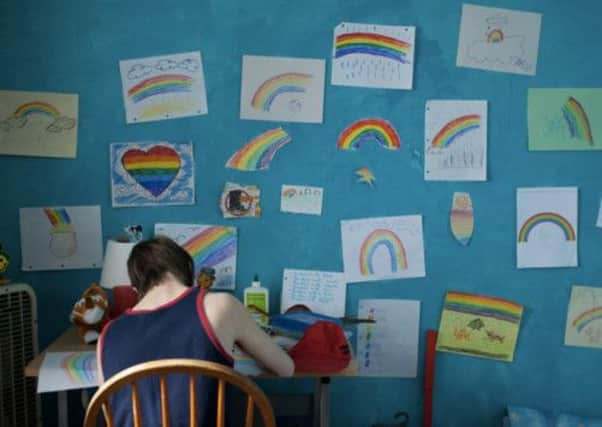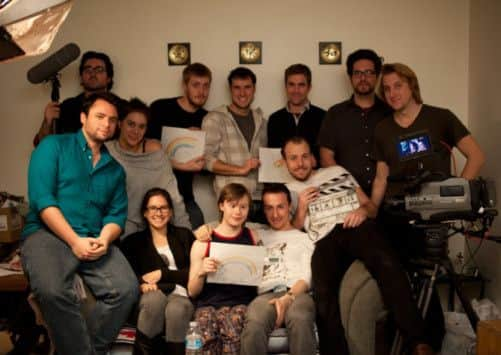Film casts light on the reality of Down’s syndrome
This article contains affiliate links. We may earn a small commission on items purchased through this article, but that does not affect our editorial judgement.


What do you think of when you think of a person with Down’s syndrome? Do you think of a person who is constantly happy? Who loves the arts? Perhaps someone who dresses slightly frumpy? If you do, you’re not alone. These are common thoughts many people have if they haven’t met a person with Down’s syndrome. However, if you ask many families of people with Down’s syndrome, they would shake their heads in frustration as this is far from accurate.
The truth is that people with Down’s syndrome all have different personalities just like everyone else. They also have different interests and their fashion senses differ just like everyone else. These truths are subtly showcased in a new short film that was featured in the recent Edinburgh International Film Festival.
Advertisement
Hide AdAdvertisement
Hide AdRainbow Connection features a young man, Eugene, with Down’s syndrome living in Toronto. Eugene is 17 years old. He attends school and works to save money for a video game. He comes home to his mum who is ill, neglectful and unable to care properly for her son – both financially and emotionally. To escape from reality, Eugene draws rainbows. In fact, he covers his walls with carefully drawn and coloured arcs.


However, Eugene cannot avoid reality when he and his mother are served with an eviction notice. He attempts to stop this from happening, which leads to bullying, gambling and theft until there’s only one solution left.
The film, which hopes to expand to a feature-length film, leaves you wanting more. But it also leaves you thinking about the issues raised throughout the story. You understand the situation that Eugene is going through as he goes through life struggles that many people of all abilities have to face. The character is not a person far removed from everyday life who is constantly smiling. This person has many facets just like everyone else.
Challenging perceptions
For Canadian director, Kire Paputts, Rainbow Connection has meant a huge opportunity to create awareness around disability in film. “I wanted to break away from the traditional, conventional portrayal of people with special needs in cinema,” he said. “When mainstream cinema and television look at people with disabilities, it’s often done in a very safe manner. They really don’t want to rock the boat or portray them outside the conventional light, which, in my opinion, is people who are always smiling, with gentle souls and who don’t really struggle with any adversity.
“With Eugene, I wanted to challenge this perception of what it’s like to live with special needs. Eugene’s storyline is one that any teenager could experience, and one that any young actor could play.
“Poverty, illness, and family struggles are issues that can affect anyone at any age. I wanted to give a demanding, mature lead role to an actor with special needs rather than perpetuating stereotypes and stigma seen in other works.”
In Rainbow Connection, the viewer can empathise with Eugene as he faces struggles while striving to attain his hopes and dreams. In the end, the film shows that people with Down’s syndrome have hopes and dreams like everyone else and they want to achieve them but just need extra support.
Where do people like Eugene get the support they need?
In Eugene’s case, he is not surrounded by a support system. His mother is unfit to care for him, he doesn’t have any extended family nor does he turn to a teacher, neighbour or colleague for support. He is isolated – left alone to figure out a complex issue. The film asks the question: where do people like Eugene get the support they need to tackle these issues? If only Eugene knew who to contact if he needed help, perhaps he wouldn’t have been led down the route he took.
Advertisement
Hide AdAdvertisement
Hide AdIt’s important that people with Down’s syndrome are properly supported throughout their lives, whether it be at school, in the workplace, to live independently or any stage in between or beyond. At Down’s Syndrome Scotland, we offer a family support service that provides support and information to people with Down’s syndrome, their families, carers and professionals to ensure the right support is there no matter the issue. Our Big Lottery-funded Making Your Way Through Life project also supports adults and young people with Down’s syndrome, like Eugene, by planning for their future and teaching life skills. This support will help pave the way for people with Down’s syndrome to realise their full potential no matter what that might be.
• Heather Irish is communications and fundraising officer for Down’s Syndrome Scotland www.dsscotland.org.uk
• To watch Rainbow Connection, click hereand type in the password: otherpeople25